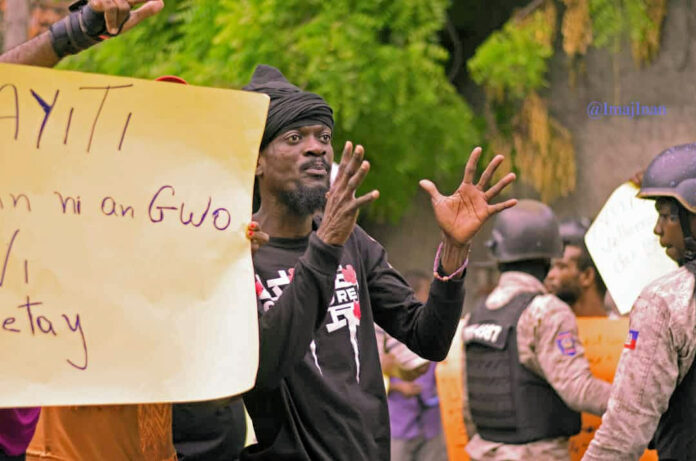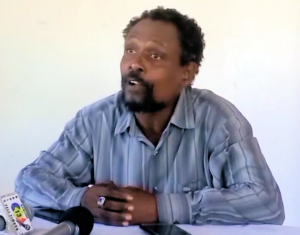
(Français)
Last week, unidentified gunmen wounded Domini Resain, the mobilization director of the National Movement for Liberty and Equality of Haitians for Fraternity (MOLEGHAF), at the organization’s headquarters in Port-au-Prince’s hilltop Fort National neighborhood.
Haïti Liberté interviewed MOLEGHAF’s secretary general Oxygène David about the attack and, more broadly, about Haiti’s current political situation and the prospects for its national liberation struggle.
Oxygène also talked about the Montana Accord coalition, which was founded one year ago on Aug. 30, 2021 at Pétionville’s Montana Hotel to lead a political transition to an elected government. MOLEGHAF pulled out of the coalition in May.
Haïti Liberté: Can you tell us what happened to the MOLEGHAF militant Domini Resain this past week?
Oxygène David: Our MOLEGHAF comrade, Domini Resain, was targeted, and we have to understand why. He was in a planning meeting with three other comrades on Wed., Aug. 24 at the MOLEGHAF headquarters in Fort National to prepare a demonstration. Domini Resain, nicknamed “Dodo,” is in charge of mobilizations for MOLEGHAF. Suddenly, he was shot three times: one bullet in his left arm, one in his left thigh, and one in his left shin.

Why was he attacked? The first reason is because comrade Domini Resain is a spearhead in today’s nationwide mobilization. He is a young man who is determined to build a new society.
We must explain that there are two types of mobilization happening in recent days in Haiti. There are mobilizations organized by traditional political parties, but those mobilizations don’t have message of class struggle; they don’t raise the masses’ demands and aspirations. Therefore, the reactionary state rarely deploys the force of its repressive apparatus to crush those mobilizations, because they don’t have a message which is anti-imperialist, which frightens the state, or which will cause the people to rise up. Most often, those demonstrations organized by reactionary, traditional politicians just march from point A to point B, without any problem. These demos usually have very limited demands, such as condemning the PHTK [the ruling Haitian Bald-Headed Party] or the like.
On the other hand, there are the popular mobilizations, with progressive or revolutionary organizations which are in the vanguard in their popular neighborhoods or rural areas.
These popular mobilizations unite around demands such as that de facto Prime Minister Ariel Henry must resign, Mme. Helen La Lime of BINUH [the Integrated Office of the United Nations in Haiti] should leave, and that the CORE Group [the U.S.-aligned ambassadors] should leave the country and butt out of Haitian affairs.

Popular organizations say that free and fair elections cannot be organized under Ariel Henry, under the oversight of U.S. imperialism and all of its capitalist financial institutions.
These organizations take to the street with a message of class struggle, saying no to hunger, to poverty, to exploitation, and this message makes them a target of the reactionary state and the lumpen agents which it has coopted.
So, Domini Resain is one of the comrades who has such a message. Therefore the PHTK’s third version, led by Ariel Henry, with all his allies like the SDP [Democratic and Popular Sector], [the social-democratic party] Fusion, and others who are collaborating and making money in the National Palace, along with some gangs, they plot to assassinate progressive revolutionary militants with a radical message.
That is why Domini “Dodo” Resain was shot three times on Aug. 24 by the rotten, reactionary state. He’s now trying to recover from his serious wounds, because we can’t retreat now. We’ve come very far in this struggle to overcome this bloody regime led by Ariel Henry and his allies.
HL: How do you see the popular forces advancing in this political conjuncture?
OD: The conjuncture is characterized by several things. Firstly, we have a fascist state which is carrying out repression and the elimination of leaders. This is augmented by the support it receives from the SDP, formerly part of the opposition in the street but now in the National Palace.
This fascist state is using bourgeois democracy to terrorize the population, which continues to be ravaged by hunger, inflation, and unemployment. The popular masses are eating out of garbage heaps and can’t buy a bucket of clean water.
Meanwhile, the U.S. imperialists are using dilatory tactics to keep Ariel Henry in power so he can organize bogus elections, while keeping control of the traditional politicians. So the political terrain is booby-trapped.
Ariel Henry is using the police and army, as well as paramilitaries, to repress the masses’ resistance.
But the masses are awakening from their deep sleep to take to the streets in giant mobilizations without the traditional political parties.
So there is a popular, progressive, revolutionary vanguard which is categorically opposed to the traditional politicians, who have no class-based vision or message.
These traditional political parties do not challenge the imperialists, but instead kiss up to them, collaborate and cohabitate with them, and thereby crush the movements of the working class, the popular neighborhoods, and the peasants, above all landless peasants, living under the heel of the big landowners (grandon).
So while carrying out terror and repression, the U.S., in concert with the regime, is trying to hold elections to put a client in power to continue plundering the nation’s riches for the U.S. imperialists.
HL: Since MOLEGHAF left the Montana Accord alliance, have other groups followed your example, and what path do you propose for popular organizations going forward?
OD: The Montana Accord coalition is all washed up. It is finished in theory and in practice.

The Montana coalition had a theory which said: “Let us have a Haitian solution.” This never existed. It never looked for a Haitian solution. It was a lie which they fed to the nation so that they could cohabitate with their bosses, the U.S. imperialists.
This all became clear as they proudly sat with [U.S. chargé d’affaires] Kenneth Merten, holding meetings at the U.S. Embassy and even in the United States, so they could crush the popular movement. So their theory is bankrupt.
But so is their practice. Their practice is bureaucracy, which never brought any results. In short, the Montana Accord group never believed in mass mobilization nor called for popular mobilization or awakening the citizenry. They never tried to have the nation rise up! They simply remained mired in procedure and bureaucracy, behind closed doors, writing what [the Montana Accord’s leading figure] Magali Comeau Denis asked them to write. It is over. It belongs to the past.
That’s why several other organizations have also pulled out of the Montana coalition, because it has no strategy to lead the masses to victory. After MOLEGHAF left the Montana coalition, the union CNOH [National Confederation of Haitian Workers] left and many popular organizations no longer recognize the Montana Accord.
So there is no more Montana Accord, no PEN Accord [of politicians Youri Latortue and Joseph Lambert], no Musseau Accord [of Prime Minister Ariel Henry and his allies]. There is only one functional accord: that of standing with the popular masses. But this is not a written accord. This accord is subscribed to by action, in practice. The popular masses accord is signed onto by rising up. “Rise up” is our slogan, our watchword. Rise up against what? Against the third version of PHTK, against Ariel Henry, against Madame La Lime, against BINUH, against the CORE Group, against USAID, against neoliberal policies, and against U.S. imperialism, which wants to shut us up and impose on us their command of all our institutions, to steal our resources, destroy the nation, and drown us with exploitation and exclusion.
Montana did nothing but put a brake on the popular mobilization. They have a wait-and-see attitude, waiting for the U.S. imperialists to give them a green-light and facilitate the political change they want, which is ludicrous. So the Montana Accord did nothing more than plunge the masses deeper into exclusion, poverty, and misery.










[…] (English) […]
[…] May 2022, MOLEGHAF , a Communist party, also withdrew support . In a recent interview , MOLEGHAF’s leader David Oxygène said that “after MOLEGHAF left the Montana coalition, the […]